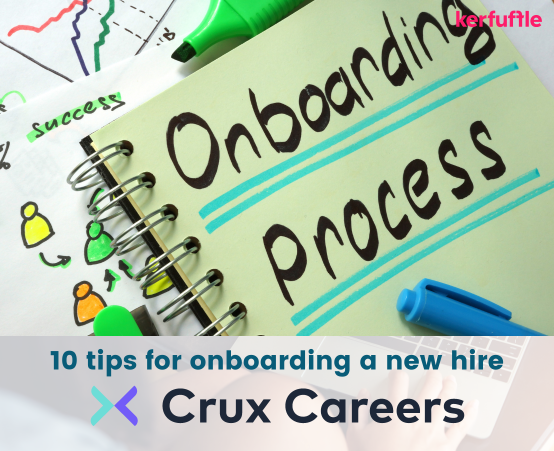10 tips for onboarding a new hire
The onboarding of new staff is vital for any company and a duty all managers should take seriously. You want to ensure your recruits not only feel comfortable and welcome in their new company, but also feel prepared to tackle everything their new role throws at them. You don’t want minor admin or technical problems to be the reason your employee can’t perform their duties and are at a loss to who to turn to.
Onboarding is also an important factor in retaining staff in the long run and improving general satisfaction. It’s proof that you are a company that cares and are invested in the wellness and success in the company, leading to more inspired and engaged employees.
So, now we know the benefits of onboarding, let’s get into tips on how to execute it successfully.
1. Start at recruitment
The job interview is a time for first impressions, and it goes both ways. While you are getting a sense of your new potential employee, they are doing the same thing to you. Ensure in this time you are being honest, clear, and enthusiastic about their place in the company. Communicate every step of the process and their day to day in the role. This also helps employee retention as well, as it allows the candidate to truly understand what the role entails. Finding a great candidate on paper, only for them to leave a few weeks into the job because there were some aspects of the position they weren’t aware of beforehand is a negative for everyone and can easily be avoided at this stage.
2. Meet up with the employee before the start date
If you have the opportunity, try to have a catch up with the new team member in a less formal setting before their start date. Grabbing a coffee in the café near their new place of work, or a drink at the local bar, or even a virtual chat. This gives you a chance to fill them in on all the little things about working in your office that might not have come up before and get a sense of their new work environment before they start. If you could make this a meeting where they can meet the entire team, say over staff happy hour or drinks after work, even better!
3. Don’t wait for their first day
To avoid bombarding new hires with an overwhelming amount of information on the first day, try providing them with all the informational materials you can before their start date, which they can read at their own pace. Create a welcome pack that keeps them up to speed in their duties, team dynamics and roles, and just things like where to park and where to get lunch nearby.
4. Schedule regular check-ins
Just dropping by for a hello with your new team member is a great idea to make them feel welcome but they might feel they’re unable to share problems in such a brief, informal setting. Some recruits share that they don’t even hear back from their manager since their initial interviews. Avoid this by scheduling check-ins where they feel comfortable to truly share how they are settling in. These should take place between manager and new hire and cover both side’s assessment of their progress and whether they need anything to continue to flourish in their role.
5. Give them a full introduction
You don’t want your new hire to feel like a stranger in their new company, so ensure that introductions are done to all staff, and more thorough ones to the team they will be working with in the day to day. This also helps build the foundations for rapport and collaboration further down the road. If in person meetings aren’t practical, a group virtual meeting with your entire team on a place like Zoom would work just as well, as long as there is time to make introductions and connections.
6. Consider each candidate
No 'one size fits all' approach works for every new hire as every role is different. Consider the candidates duties and responsibilities before you implement the onboarding. Try to tailor your onboarding program to every role in the company so you have customised start protocols for each position you know you have to fill.
7. Take time in the first week to discuss work styles
Just like every role is different, each person filling those roles are different and all work to their own strengths. Take the time early on to let them tell you how they can work the most efficiently for you. This conversation can cover things like when are they most productive, how they cope with stress and what helps alleviate it, and how they’d like to receive feedback. This can avoid some clashing and miscommunication down the line and help keep them as happy and efficient as possible.
8. Create a mentor/buddy system
This needn’t be an overly official or even long-term position but it’s incredibly beneficial for the new hire to have someone they know they can turn to for the small things they feel uncomfortable asking anyone else and to know they have someone looking out for them. Consider who would fit this role well – this may be a case of personality matching rather than rank or seniority.
9. Consider what they’ll need to know
Some things in the day to day running of your company may seem like second nature to you and everyone else by now but consider it from a completely fresh pair of eyes. Think of all the things unique to your company, building, team, or even industry. Create a FAQ or a jargon glossary that may save a lot of time explaining little things repeatedly and can be used as a reference for everyone.
10. Avoid ambiguity
You want your new hire to know exactly what is expected of them. Being unsure about any part of a new job can cause anxiety and greatly impair productivity. Don’t rely just on employee handbooks or job description to convey what they are required to do. A key part of the onboarding process should be conveying both major and minor points of the job, such as deadlines, deliverables, and company goals.
To learn how Crux can help you, head over to: https://www.kerfuffle.com/suppliers/crux





